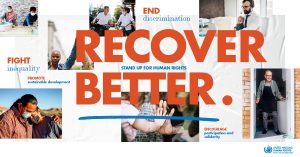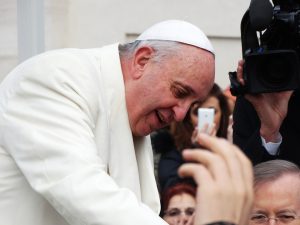United Nations (UN) Human Rights Day – 10 December
 When I was working in Kenya in 2004, I had the opportunity to visit a slum school and was greeted by 7-year-old Ashuru, who companionably took my hand and showed me around, introducing me to his friends and leading me into his classroom – a simple mudbrick room with a dirt floor, a few desks and hugely beaming smiles from front to back. The class sang enthusiastically, recited a poem, “I love my school”, and excitedly shared all they were learning. Later, we visited Kibera, the slum area where these children live. It is the biggest slum in Africa and one of the largest in the world. For me it was a privilege, a challenge and a never-to-be forgotten experience. It replicated the experiences I’d had in Peru in the 90s. The contrast between the generally well-resourced young people I’d taught in Australia and these smiling eager children with so little in material wealth couldn’t have been more stark. Yet I was struck again, as I’ve been so many times in my life, by the similarities of vision and passion of the human heart, especially of young people across the globe.
When I was working in Kenya in 2004, I had the opportunity to visit a slum school and was greeted by 7-year-old Ashuru, who companionably took my hand and showed me around, introducing me to his friends and leading me into his classroom – a simple mudbrick room with a dirt floor, a few desks and hugely beaming smiles from front to back. The class sang enthusiastically, recited a poem, “I love my school”, and excitedly shared all they were learning. Later, we visited Kibera, the slum area where these children live. It is the biggest slum in Africa and one of the largest in the world. For me it was a privilege, a challenge and a never-to-be forgotten experience. It replicated the experiences I’d had in Peru in the 90s. The contrast between the generally well-resourced young people I’d taught in Australia and these smiling eager children with so little in material wealth couldn’t have been more stark. Yet I was struck again, as I’ve been so many times in my life, by the similarities of vision and passion of the human heart, especially of young people across the globe.
And this year, as we celebrate the UN Human Rights Day on 10 December, we are reminded once again, both that such contradictions and similarities continue to exist right across our world, and that we still yearn for justice and equality for all.
It is this foundation and hope that is at the heart of the Human Rights Declaration that we celebrate on 10 December. Ratified in December 1948, The Universal Declaration of Human Rights, with its 30 articles, was signed by every country, and is recognised as binding on all. The articles are seen to be interrelated, interdependent and indivisible. At their best, they remind us of the freedoms and protections that belong to every one of us, stating clearly that “human rights are inherent to each person regardless of sex, colour, class or creed.”
Understandably then, the theme for this year’s Human Rights Day (Recover better – stand up for Human Rights) relates to the COVID-19 pandemic and focuses on the call to build such a world by ensuring that human rights are pivotal to recovery efforts across the planet. It was hope-filled and tremendously reassuring that, at the recent G20 summit, 19 of the 20 nations agreed to work together to ensure that future COVID-19 vaccines are a global public good with equitable access for everyone, everywhere. Indeed, a remarkable step forward for our world!
We in Australia have been blessed by our relative safety during COVID-19. As we support the UN efforts to create equal opportunities for all, we are also encouraged by the further call to tackle “entrenched, systematic and intergenerational inequalities, exclusion and discrimination.”
 For us in Australia, these will involve questions and action for the Uluru Statement from the heart, the uninvited imposition of the cashless debit cards, the reality of increased imprisonment and deaths in custody, the increase in homelessness and the lack of affordable housing. They will demand advocacy for the Biloela family, the families on Nauru, the men suffering in Papua New Guinea, the people in community detention in Australia, those on temporary visas, as well as international students – all of whom have been excluded from Government assistance during the Coronavirus crisis. They will call us to continue our support for environmental action and care of earth.
For us in Australia, these will involve questions and action for the Uluru Statement from the heart, the uninvited imposition of the cashless debit cards, the reality of increased imprisonment and deaths in custody, the increase in homelessness and the lack of affordable housing. They will demand advocacy for the Biloela family, the families on Nauru, the men suffering in Papua New Guinea, the people in community detention in Australia, those on temporary visas, as well as international students – all of whom have been excluded from Government assistance during the Coronavirus crisis. They will call us to continue our support for environmental action and care of earth.
In this post truth era, Pope Francis challenges all of us:
Jan Barnett rsj
Josephite Justice Co-ordinator
Images:
Recover Better obtained from Human Rights Day – Resources | United Nations.
Pope Francis by reynaldodallin. Obtained from Pixabay.
